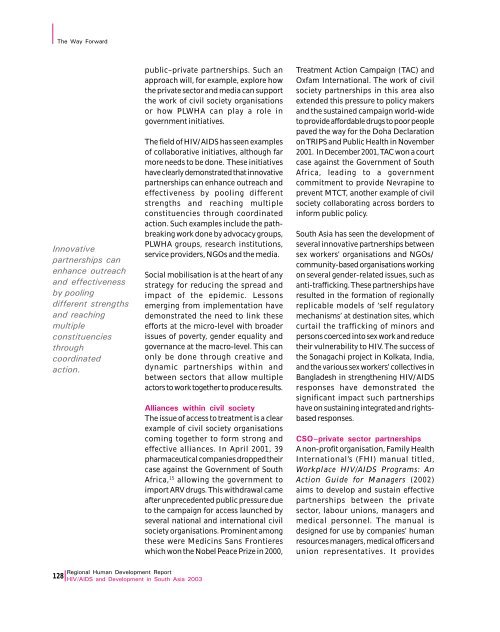Download Report - UNDP Asia-Pacific Regional Centre - United ...
Download Report - UNDP Asia-Pacific Regional Centre - United ...
Download Report - UNDP Asia-Pacific Regional Centre - United ...
Create successful ePaper yourself
Turn your PDF publications into a flip-book with our unique Google optimized e-Paper software.
The Way orwardInnovativepartnerships canenhance outreachand effectivenessby poolingdifferent strengthsand reachingmultipleconstituenciesthroughcoordinatedaction.public–private partnerships. Such anapproach will, for example, explore howthe private sector and media can supportthe work of civil society organisationsor how PLWHA can play a role ingovernment initiatives.The field of HIV/AIDS has seen examplesof collaborative initiatives, although farmore needs to be done. These initiativeshave clearly demonstrated that innovativepartnerships can enhance outreach andeffectiveness by pooling differentstrengths and reaching multipleconstituencies through coordinatedaction. Such examples include the pathbreakingwork done by advocacy groups,PLWHA groups, research institutions,service providers, NGOs and the media.Social mobilisation is at the heart of anystrategy for reducing the spread andimpact of the epidemic. Lessonsemerging from implementation havedemonstrated the need to link theseefforts at the micro-level with broaderissues of poverty, gender equality andgovernance at the macro-level. This canonly be done through creative anddynamic partnerships within andbetween sectors that allow multipleactors to work together to produce results.Alliances within civil societyThe issue of access to treatment is a clearexample of civil society organisationscoming together to form strong andeffective alliances. In April 2001, 39pharmaceutical companies dropped theircase against the Government of SouthAfrica, 15 allowing the government toimport ARV drugs. This withdrawal cameafter unprecedented public pressure dueto the campaign for access launched byseveral national and international civilsociety organisations. Prominent amongthese were Medicins Sans Frontiereswhich won the Nobel Peace Prize in 2000,Treatment Action Campaign (TAC) andOxfam International. The work of civilsociety partnerships in this area alsoextended this pressure to policy makersand the sustained campaign world-wideto provide affordable drugs to poor peoplepaved the way for the Doha Declarationon TRIPS and Public Health in November2001. In December 2001, TAC won a courtcase against the Government of SouthAfrica, leading to a governmentcommitment to provide Nevrapine toprevent MTCT, another example of civilsociety collaborating across borders toinform public policy.South <strong>Asia</strong> has seen the development ofseveral innovative partnerships betweensex workers’ organisations and NGOs/community-based organisations workingon several gender-related issues, such asanti-trafficking. These partnerships haveresulted in the formation of regionallyreplicable models of ‘self regulatorymechanisms’ at destination sites, whichcurtail the trafficking of minors andpersons coerced into sex work and reducetheir vulnerability to HIV. The success ofthe Sonagachi project in Kolkata, India,and the various sex workers’ collectives inBangladesh in strengthening HIV/AIDSresponses have demonstrated thesignificant impact such partnershipshave on sustaining integrated and rightsbasedresponses.CSO–private sector partnershipsA non-profit organisation, Family HealthInternational’s (FHI) manual titled,Workplace HIV/AIDS Programs: AnAction Guide for Managers (2002)aims to develop and sustain effectivepartnerships between the privatesector, labour unions, managers andmedical personnel. The manual isdesigned for use by companies’ humanresources managers, medical officers andunion representatives. It provides<strong>Regional</strong> Human Development <strong>Report</strong>128 HIV/AIDS and Development in South <strong>Asia</strong> 2003
















